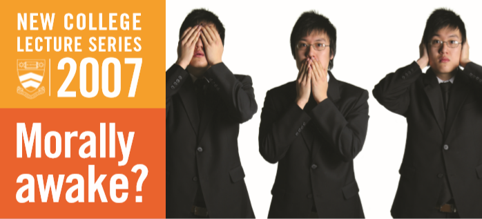
Morally Awake?
Much has been said about the need for moral judgment, foundational values and ethical practice in business, public and personal life. Oliver O'Donovan one of the world’s leading Christian ethicists addressed this topic by exploring the concept of 'moral wakefulness'; the mind alert to shape decisions and actions. The experience of moral wakefulness is universal, and ways of describing the experience, and the philosophical puzzles they pose, are legion. How do we overcome the constant tensions that arise between the objective and subjective, valuing and deciding, “good” and the “right”? Professor O’Donovan believes that Christian faith can shed light on this commonest and yet most mysterious of human experiences. Professor O'Donovan explored this topic in three lectures over three nights.
Professor O'Donovan
Oliver O'Donovan is one of the foremost global scholars in the field of Christian ethics. He has made significant contributions to political theology, both contemporary and historical. He is currently Professor of Christian Ethics & Practical Theology at the University of Edinburgh School of Divinity, Scotland (since 2006). Previously he was Regius Professor of Moral & Pastoral Theology and Canon of Christ Church at the University of Oxford (1982-2006). He has also taught at Wycliffe Hall, Oxford (1972-77) and Wycliffe College, Toronto (1977-82). He has published 10 major works which have made a significant impact in the world of political theology and ethics.
Tuesday 4 September | Waking
The metaphor of wakefulness is constantly drawn on in the gospels to focus the heart of moral sensibility. How does the invocation of God serve to make the moral stance conceivable to us?
Wednesday 5 September | Admiring
Moral attentiveness to the world is a task of affective intelligence, of “admiration”, not merely of “cognition”. What kind of coherence and order do we suppose in our world and how do assertions about a “Word of God” serve to underpin that coherence?
Thursday 6 September | Resolving
How can we make the transition of reason from what is the case to what we are to do? How may we intelligently “frame” an action to perform without arbitrariness?